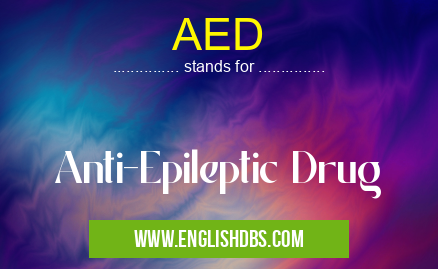What does AED mean in HOSPITALS
Anti-Epileptic Drugs (AEDs) are a class of medications that are used to reduce the frequency and severity of seizures. AEDs act by altering brain chemistry in order to reduce seizure activity. AEDs are typically prescribed by a doctor and should be taken as directed. It is important to note that AEDs can cause serious side effects, so it is important to discuss any potential risks with your doctor before taking them.

AED meaning in Hospitals in Medical
AED mostly used in an acronym Hospitals in Category Medical that means Anti-Epileptic Drug
Shorthand: AED,
Full Form: Anti-Epileptic Drug
For more information of "Anti-Epileptic Drug", see the section below.
Essential Questions and Answers on Anti-Epileptic Drug in "MEDICAL»HOSP"
What is an Anti-Epileptic Drug (AED)?
An Anti-Epileptic Drug (AED) is a class of medications that are used to reduce the frequency and severity of seizures. They work by altering brain chemistry in order to reduce seizure activity.
Who should take AEDs?
AEDs are typically prescribed by a doctor and should only be taken as directed. Your doctor will be able to determine whether or not AEDs are appropriate for you based on your medical history, lifestyle and any other medications you may be taking.
Are there any side effects associated with taking AEDs?
Yes, taking AEDs could potentially cause serious side effects such as fatigue, dizziness, decreased coordination, weight gain, nausea/vomiting, headaches, blurred vision and rash. It is best to discuss these potential risks with your doctor before deciding if taking an AED is the right decision for you.
How often should I take my AED?
The dosage instructions for each individual patient vary depending on their condition and response to the drug, so it is best to follow your doctor's exact instructions when taking an AED. Usually this means taking one dose every 8 - 12 hours as directed by your physician or pharmacist.
Can I drink alcohol while on an AED?
No, drinking alcohol while on an AED could increase the risk of having dangerous side effects or worsening symptoms of epilepsy. If you choose to drink alcohol while taking an Anti-Epileptic Drug (AED), you should talk to your doctor beforehand about possible risks and how much alcohol would be safe for you to consume while still taking your medication correctly.
Final Words:
Anti-Epileptic Drugs (AEDs) are widely prescribed medications that can help control seizures in individuals who suffer from epilepsy or other neurological disorders. While these drugs can provide great relief from symptoms associated with epilepsy, they can also have serious side effects if not taken properly - which is why it's important for individuals considering using them have a discussion with their healthcare provider about all potential risks and benefits beforehand.
AED also stands for: |
|
| All stands for AED |
